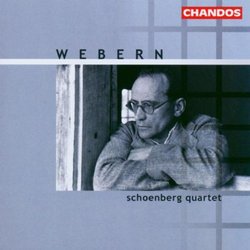| All Artists: Anton Webern, Narucki, Groetenhuis, Schoenberg Quartet Title: Webern: Chamber Music for Strings Members Wishing: 2 Total Copies: 0 Label: Chandos Release Date: 7/22/2003 Genre: Classical Styles: Chamber Music, Historical Periods, Classical (c.1770-1830), Modern, 20th, & 21st Century, Instruments, Strings Number of Discs: 1 SwapaCD Credits: 1 UPC: 095115108321 |
Search - Anton Webern, Narucki, Groetenhuis :: Webern: Chamber Music for Strings
 | Anton Webern, Narucki, Groetenhuis Webern: Chamber Music for Strings Genre: Classical
|
Larger Image |
CD Details |
CD ReviewsThe best interpretation -- warm, human, questioning and open R. Hutchinson | a world ruled by fossil fuels and fossil minds | 06/12/2005 (5 out of 5 stars) "I have finally found a fantastic set of Webern's string quartets and trios! The Schoenberg Quartet (SQ) of the Netherlands, which formed in 1976, devoted to the composers of the Second Viennese School (Schoenberg, Webern, Berg and Zemlinsky), has developed unique interpretations over many years of practice and performance. This Chandos disc includes recordings made between 2000 and 2002. I particularly appreciate the chronological presentation of the works, from the early Romantic period beginning in 1905, through the stunning atonal masterpieces of 1909 through 1914, to the late 12-tone works of the Twenties and Thirties. The Emerson Quartet (EQ) disc on DG, by contrast (WORKS FOR STRING QUARTET -- see my review), does not organize the compositions in strictly chronological order.
This 2003 SQ disc does not contain precisely the same works as the 1995 EQ disc -- the EQ includes the "Movement for String Trio," a posthumously published work from 1925, and the "Three Pieces for String Quartet" with soprano, from 1913, while the SQ omits these and includes instead "Four Pieces" (Op. 7) for violin and piano from 1910-1914, the "Sonata" (Op. post.) for cello and piano of 1914, and "Three Little Pieces" (Op. 11) for cello and piano, also of 1914. I have heard three string quartets play Webern's music -- the Juilliard Quartet (JQ), the Emerson Quartet, and now the Schoenberg Quartet. The JQ recordings, from the late 1960s, are included in the Sony box, WEBERN: COMPLETE WORKS (Op. 1-31), with Boulez conducting (see my 11/26/01 review). The EQ recordings are included in the more recent DG box COMPLETE WEBERN, also with Boulez conducting, which is "more than complete," and includes not only all the numbered works, but all other unpublished works as well, mainly early ones. Based on a recent comparison, here are my impressions of the three performances. The EQ, not surprisingly, plays faster. They also sound quite precise and compressed. The JQ takes the tempos more slowly, which makes everything by Webern sound tragic. On the plus side, their interpretation is more spacious, less claustrophobic. The SQ, the stars of this review, take the tempos almost as slowly as the JQ, but strike an entirely different tone -- their Webern sounds like an open-ended question, like questioning. This, to my ears, is preferable to either of the other accounts. The EQ make the music sound matter-of-fact and purposeful -- "we don't know where we're going, but it doesn't matter, we'll do it efficiently." The JQ, as mentioned, stretch the music out to the point of wallowing in despair. The SQ manage to walk the tightrope perfectly, striking just the right balance so that the listener is invited to join the composer and the players in a quest, searching for meaning, searching together, a very warm, very human stance that realizes the best, the beauty, the pain, and the tenuous hope in the music. Could it be that a quartet with two women (violin and cello) and two men (violin and viola) is more likely to find this quality than an all-male quartet? The Chandos packaging is of the highest quality -- notice the superb cover. The Schoenberg Quartet has also recorded Schoenberg's CHAMBER MUSIC FOR STRINGS for Chandos (no surprise), a 5-disc set, as well as the complete chamber music for strings of Zemlinsky and the complete chamber music of Berg. If you are looking for a set of Webern's chamber music for strings that you will want to listen to over and over again, this is the one." |

 Track Listings (27) - Disc #1
Track Listings (27) - Disc #1